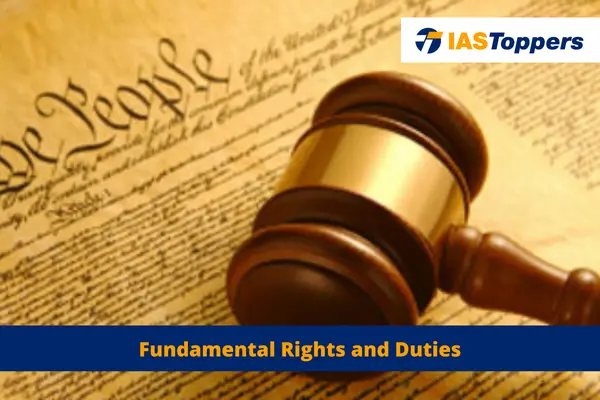The major difference between Fundamental Rights and Fundamental Duties is rights are given to both citizens and foreigners, whereas duties are exclusively for citizens of India. Fundamental Rights are an important part of the constitution which gives people and citizens protection from the state as well as from their fellow citizens. Fundamental Duties are important to build unity, patriotism, scientific temper etc within the state and its citizens. Both Fundamental Rights and Duties are essential for a healthy democracy.
Difference between Fundamental Rights and Fundamental Duties will be helpful for UPSC IAS Exam preparation. GS Paper-2 Indian Polity.
Table of Content
- Fundamental Rights
- Fundamental Duties
- Difference between Fundamental Rights and Fundamental Duties
- Conclusion
- Frequently Asked Questions (FAQs)
Fundamental Rights
- Individuals possess rights that are essential for their survival and development.
- Fundamental rights hold significance due to their inclusion in the Constitution and their justiciable nature.
- Part III of the Indian Constitution grants these rights.
- The Constitution guarantees eight fundamental rights to Indian citizens, including:
- The right to equality.
- The right to freedom.
- The right against exploitation.
- The right to freedom of religion.
- Cultural and educational rights.
- The right to constitutional remedies.
- Cultural and educational rights.
- The right to privacy.
Fundamental Duties
- The fundamental duties were introduced into the constitution through the 42nd Amendment in 1976, based on the recommendations of the Swaran Singh Committee appointed by the government.
- These duties hold significance in the Indian constitution, even though they are not legally enforceable.
- The 86th Amendment in 2002 increased the number of Fundamental Duties from ten to eleven.
- It mandated every parent or guardian to ensure educational opportunities for their child or ward between the ages of six and fourteen years.
- Other Fundamental Duties include:
- Respecting India’s national symbols, especially the Constitution.
- Preserving its legacy.
- Conserving its composite culture.
- Contributing to its defense.
Difference between Fundamental Rights and Fundamental Duties
The major differences between Fundamental Rights and Duties are given below:
| Fundamental Rights | Fundamental Duties |
| Part 3 of the Indian Constitution encompasses the rights given to Indians. | Article 51-A of Part IV A of the Indian Constitution deals with Duties. |
| The rights were inspired by the United States Constitution. | Duties were influenced by the former Soviet Union’s Constitution (USSR). |
| Fundamental Rights are the basic rights of all citizens. | Fundamental Duties are the moral responsibilities of all citizens. |
| These rights apply to everyone, regardless of various factors. | Duties promote patriotism and preserve India’s unity for all citizens. |
| Fundamental rights are guaranteed and cannot be revoked. | Fundamental Duties can be revoked, except during emergencies. |
| Some rights remain unaffected even during emergencies. | During emergencies, Fundamental Duties are not suspended. |
| Fundamental Rights have certain limitations for the general welfare. | Fundamental Duties are absolute in nature. |
| Certain individuals, like the Indian Military personnel, have limited access to rights. | All Indian citizens, including military personnel, are subject to Duties. |
| The Supreme and High Courts enforce Fundamental Rights. | Courts cannot enforce Fundamental Duties. |
| Fundamental Rights can be amended but within certain limits. | Fundamental Duties are completely amendable. |
| Some Rights are exclusive to Indian citizens, while others are applicable to foreigners as well. | Fundamental Duties are exclusively for Indian citizens. Foreigners are not bound by them. |
| Some Rights protect against individuals, while others safeguard against the State. | Duties primarily demand from the country or society as a whole rather than individuals. |
Conclusion
Fundamental Rights and Fundamental Duties are an essential part of the Indian constitution. There are 6 Fundamental Rights and 11 Fundamental Duties mentioned in the Constitution under Part III and Article 51A respectively. These rights are important for the individual personality development of people and the duties are responsibilities for citizens towards the country.
Ref: Source-1
FAQs (Frequently Asked Questions)
What are Fundamental Rights?
A group of rights recognized by a high degree of protection from encroachment. These rights are specifically identified in a constitution, or have been found under due process of law.
Which articles of the Indian constitution guarantee Fundamental Rights?
Part 3 (Articles 12 to 35) of the constitution deals with the Fundamental Rights.
What is the difference between Fundamental Rights and Fundamental Duties in enforceability?
Fundamental Rights are enforceable by the Supreme and High Courts. Fundamental Duties are not enforceable by the courts.
Why Fundamental Duties are important?
The importance of fundamental duties defines the moral obligations of all citizens to help in the promotion of patriotism and to uphold the unity of India.



